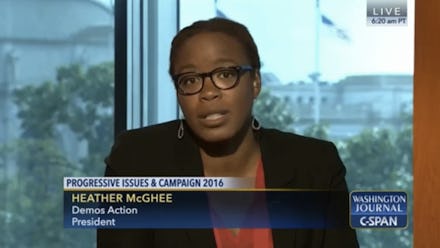Heather McGhee has the best answer for a C-SPAN caller who wants to stop being prejudiced

Most people don't like to admit to their biases, hiding behind excuses like their "one black friend" or starting sentences with, "I'm not racist, but..."
But on Sunday, an anonymous caller dialed into C-SPAN to come clean, telling guest Heather McGhee candidly, "I am a white male and I am prejudiced."
The caller wasn't looking to engage in a verbal sparring match over race in the United States — instead he asked McGhee, the president of public policy organization Demos, for advice on how to let go of his prejudices.
"It is something I wasn't taught but it's kind of something that I learned," the caller said. He told McGhee he is influenced by articles he reads in the newspaper about drug use and crime in black communities, and that he responds to the headlines with fear.
"I don't like to be forced to like people," the caller said. "I like to be led to like people through example. What can I do to change? You know, to be a better American?"
McGhee began her response with a simple thank you. "Thank you so much for being honest and for opening up this conversation because it is simply one of the most important ones we have to have in this country," she said.
McGhee suggested the caller get to know black families in his neighborhood and engage in conversations about race in his community. She advised he read up on black history and, if he's religious, join a black church.
Later, McGhee told the Washington Post she felt a "sense of connection to his vulnerability" and an opportunity for self-healing.
"I was born after the voices of the civil rights movement had faded, we were supposed to be color blind, and racism was supposed to be over," McGhee said to the Post. "So many people of color are desperate just to have the conversation."
McGhee said that while many white people want to be on the "right side of history," it's become more and more difficult to bridge divides and engage in productive discussions about identity.
"When he made that admission, I think it resonated because a lot of white people knew where he was coming from and were impressed that he was brave or that I was compassionate," she said.
Watch the exchange below: